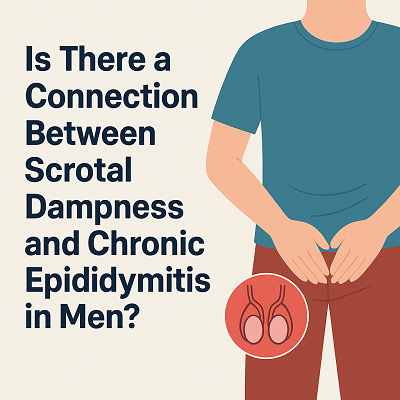Is There a Connection Between Scrotal Dampness and Chronic Epididymitis in Men?
If you're a man who has ever experienced persistent dampness in the scrotum, you're not alone. It's that uncomfortable, sticky sensation down there—too much sweating, occasional itching, and sometimes even an unpleasant odor. Whether you're sitting or walking, it just feels off. And yes, it's awkward.
Now let's talk about chronic epididymitis—another common issue in men's reproductive health. This condition involves persistent inflammation of the epididymis, causing dull pain and a sense of heaviness or swelling in the testicular area. It can seriously interfere with daily life and comfort.
So, is there a link between scrotal dampness and chronic epididymitis? Understanding this relationship is important for any man concerned about his reproductive health. It helps you better identify what's going on and take the right steps—whether it's prevention or timely treatment.

1. Common Causes of Scrotal Dampness
a. Physiological Factors
The skin of the scrotum is packed with sweat glands. Their main job? Regulating temperature to keep the testicles at their optimal working condition. So when it's hot outside, you're in a humid environment, or after intense physical activity, it's perfectly normal for the scrotum to sweat. This type of dampness isn't a disease—just your body doing its job.
b. Pathological Factors
Prostatitis: Chronic prostatitis can interfere with the autonomic nervous system, leading to overactive sweat glands in the scrotum and excessive moisture.
Varicocele: This condition increases the temperature around the testicles, which stimulates sweat gland activity and leads to a damp environment.
Other Health Issues: Endocrine disorders like diabetes or thyroid dysfunction can also disrupt the body's ability to regulate moisture, resulting in a persistently damp scrotum.
2. Causes and Symptoms of Chronic Epididymitis
a. Causes
Infection: The most common cause is bacterial or viral infection—E. coli and Staphylococcus are common culprits. These pathogens can travel from the urethra or vas deferens to the epididymis, triggering inflammation.
Secondary Conditions: Inflammation in other parts of the urogenital system, such as prostatitis or urethritis, can spread to the epididymis. A sedentary lifestyle or prolonged fatigue can lower immune function, increasing the risk.
b. Symptoms
Men with chronic epididymitis often experience a dull ache or heaviness in the epididymis. Pain may also radiate to the groin or lower abdomen. Some may notice the scrotum feels warmer and damper than usual due to localized inflammation.
3. How Are Scrotal Dampness and Chronic Epididymitis Related?
a. Mutual Influence
Chronic Epididymitis Leading to Dampness: Inflammation can cause the surrounding blood vessels to dilate, disrupting normal circulation. This may lead to increased sweat and exudate in the area, making the scrotum feel damper.
Dampness Worsening Epididymitis: A moist environment is ideal for bacterial growth. Excessive moisture can increase the risk of new infections or worsen existing ones, intensifying symptoms of chronic epididymitis.
b. Not Always Connected
That said, not every case of scrotal dampness means you have chronic epididymitis. As mentioned earlier, physiological and other pathological factors may also be to blame.
Likewise, not all men with chronic epididymitis will experience scrotal dampness. It depends on individual health conditions and the severity of the inflammation.
4. How to Relieve Symptoms of Scrotal Dampness and Chronic Epididymitis
a. Lifestyle Adjustments
Keep the scrotum clean and dry. Wash daily with warm water and dry thoroughly afterward.
Wear loose, breathable, and sweat-absorbing underwear to reduce moisture and heat buildup.
Avoid sitting for long periods. Incorporate light activities like walking or jogging to promote blood circulation.
Stay away from smoking, alcohol, and spicy foods, which can worsen inflammation and discomfort.
b. Medical Treatment
If scrotal dampness becomes severe or itchy, topical medications may help relieve symptoms. For chronic epididymitis, treatment typically includes antibiotics to control infection and anti-inflammatory drugs to reduce swelling.
Herbal formulas such as Diuretic and Anti-inflammatory Pill may also support recovery by:
- Enhancing blood circulation
- Regulating the internal environment
- Reducing inflammation and helping prevent recurrence
Final Thoughts
There can be a connection between scrotal dampness and chronic epididymitis—but one doesn't always mean the other is present. They may influence each other, but each condition also has its own set of causes.
If you're experiencing either symptom, don't guess or self-medicate. Get checked by a doctor to determine the exact cause and get appropriate treatment. Taking your health seriously today can make all the difference tomorrow.



